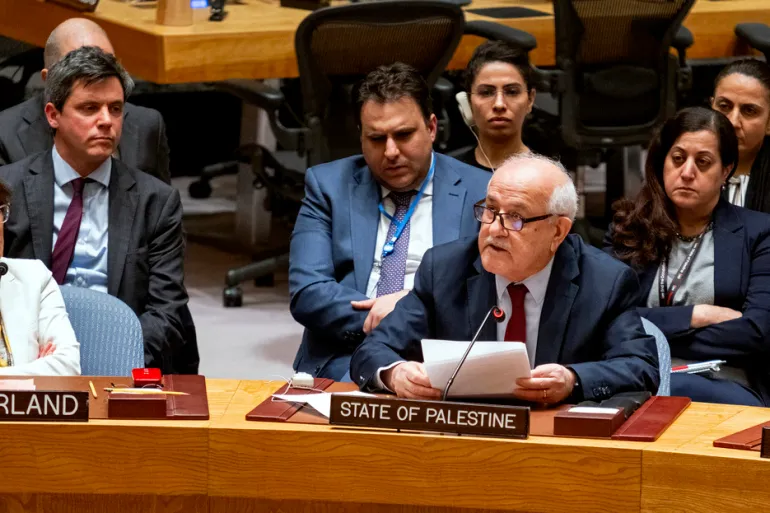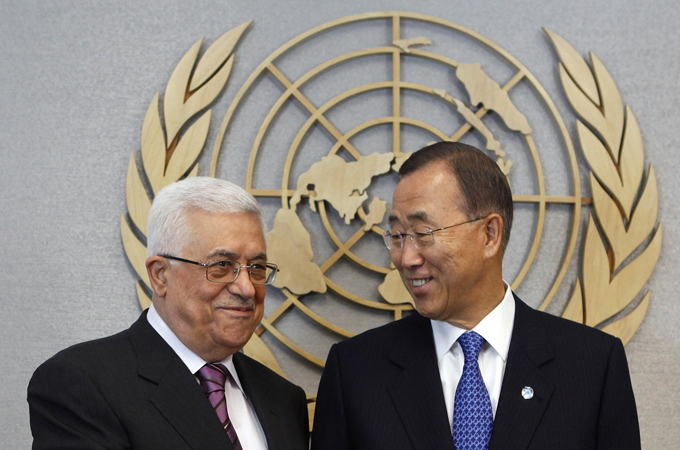As Palestine Applies for Full UN Membership, What’s in the Way?
UNITED NATIONS, 15 Apr 2024
Al Jazeera - TRANSCEND Media Service

Palestinian Ambassador to the United Nations Riyad Mansour addresses the UN Security Council on 25 Mar 2024, after a vote that passed a ceasefire resolution in Gaza during the Muslim holy month of Ramadan, its first demand to halt fighting.
[Craig Ruttle/AP Photo]
History set to be repeated as the US prepares to wield veto, cynically insisting Palestine must negotiate statehood with Israel first.
9 Apr 2024 – The UN Security Council on Monday asked its membership committee to review the Palestinian Authority’s application to be made a full member state of the United Nations. The PA is currently a non-member observer state like the Vatican.
The application, which coincided with six months of Israel’s war on Gaza, revives a longstanding bid. Malta’s UN ambassador Vanessa Frazier, the UNSC’s current president, said on Monday that the body would make a formal decision in April.
Palestinian UN envoy Riyad Mansour said that all Palestine wants is to be treated as “equals to other nations and states”. More than 33,000 Palestinians have been killed in Israel’s war on Gaza, and a state of near-famine prevails over large parts of the besieged Palestinian territory.
At the General Assembly, Ambassador Dr. Riyad Mansour reiterates that all we ask for is our rightful place among nations and to be treated as equals 🇵🇸🇺🇳 pic.twitter.com/W4VfmXbNUE
— State of Palestine (@Palestine_UN) April 8, 2024
But this is not the first time that Palestine has pushed for full UN membership. A previous attempt in 2011 didn’t even make it to a vote. And even if it had, the veto-wielding United States had pledged to block it.
So, what’s different now? Can Palestine succeed this time around?
What happened before?
“This is a historic moment again,” said Mansour on Monday, referring back to Palestine’s original membership application made by Palestinian President Mahmoud Abbas to the UN’s then-Secretary-General Ban Ki-moon in 2011.

Back then, a UNSC committee assessed the bid for several weeks but was unable to reach a unanimous position. The Security Council never formally voted on a resolution on Palestinian membership.
Diplomats said Palestine lacked the minimum nine votes needed to adopt a resolution. The situation saved the US, Israel’s closest ally, from having to wield its veto to deny Palestinian membership.
The US has repeatedly said full UN membership should follow a deal between Israel and the Palestinians.
After the failed membership bid, the UN General Assembly upgraded Palestine from a “non-member observer entity” to a “non-member observer state” in 2012.
What’s the process at the UNSC now?
The PA last week formally asked the UN Security Council to reconsider its 2011 application to become a full member of the world body.
The 15-member membership committee will reconvene for a second time this week on Thursday to further discuss whether Palestine satisfies conditions.
They can either shelve the application or put it forward for a formal vote in the UNSC.
Approval requires at least nine votes in favour, with no vetoes. The UNSC’s five permanent members – the US, Russia, China, France and Britain – hold vetoes.
But the US has indicated that its opposition to Palestinian member status in the UN, in the absence of a broader deal with Israel, stays intact.
“Our position has not changed,” Robert Wood, US deputy ambassador to the UN, said last week.
In essence, that means it is likely that the US would veto the Palestinian Authority’s application if it does come up for a vote in the UNSC.
What happens if the application does pass the UNSC?
If the Palestinian Authority’s application does get through the UNSC, it then moves to the UNGA, where it needs a two-thirds majority to be approved.
A country cannot join the United Nations as a member state unless both the Security Council and General Assembly approve.
The application stands a better chance in the UNGA than in the UNSC. Already, 139 nations – comfortably more than two-thirds of the General Assembly – recognise Palestine as a state.
And unlike the UNSC, no nation has a veto to overrule the majority in the UNGA.
What has Israel said?
Israel has long argued that allowing the Palestinian Authority to get full member status of the UN independent of talks between the sides would effectively jeopardise negotiations for a future Palestinian state.
But in recent years, Israel – especially under Prime Minister Benjamin Netanyahu – has sharply moved away from a two-state solution, leaving those negotiations less relevant for Palestinian statehood.
On Monday, Israel’s UN ambassador, Gilad Erdan, drew links between Palestinian statehood and his country’s ability to survive. Harking to the UN’s establishment, he said “the same genocidal ideology that this body was founded to combat is still prevalent among the Palestinians”.
The US, for its part, remained equally intransigent. “The issue of full Palestinian membership is a decision that should be negotiated between Israel and the Palestinians,” Wood told reporters.
Go to Original – aljazeera.com
Join the BDS-BOYCOTT, DIVESTMENT, SANCTIONS campaign to protest the Israeli barbaric siege of Gaza, illegal occupation of the Palestine nation’s territory, the apartheid wall, its inhuman and degrading treatment of the Palestinian people, and the more than 7,000 Palestinian men, women, elderly and children arbitrarily locked up in Israeli prisons.
DON’T BUY PRODUCTS WHOSE BARCODE STARTS WITH 729, which indicates that it is produced in Israel. DO YOUR PART! MAKE A DIFFERENCE!
7 2 9: BOYCOTT FOR JUSTICE!
Tags: Colonialism, Crimes against Humanity, Ecocide, Ethnic Cleansing, Famine, Gaza, Genocide, Genocide Convention, Hamas, Hunger, International Court of Justice ICJ, Israel, Israeli occupation, Massacre, Palestine, USA, United Nations, War crimes, West Bank
DISCLAIMER: The statements, views and opinions expressed in pieces republished here are solely those of the authors and do not necessarily represent those of TMS. In accordance with title 17 U.S.C. section 107, this material is distributed without profit to those who have expressed a prior interest in receiving the included information for research and educational purposes. TMS has no affiliation whatsoever with the originator of this article nor is TMS endorsed or sponsored by the originator. “GO TO ORIGINAL” links are provided as a convenience to our readers and allow for verification of authenticity. However, as originating pages are often updated by their originating host sites, the versions posted may not match the versions our readers view when clicking the “GO TO ORIGINAL” links. This site contains copyrighted material the use of which has not always been specifically authorized by the copyright owner. We are making such material available in our efforts to advance understanding of environmental, political, human rights, economic, democracy, scientific, and social justice issues, etc. We believe this constitutes a ‘fair use’ of any such copyrighted material as provided for in section 107 of the US Copyright Law. In accordance with Title 17 U.S.C. Section 107, the material on this site is distributed without profit to those who have expressed a prior interest in receiving the included information for research and educational purposes. For more information go to: http://www.law.cornell.edu/uscode/17/107.shtml. If you wish to use copyrighted material from this site for purposes of your own that go beyond ‘fair use’, you must obtain permission from the copyright owner.
Join the discussion!
We welcome debate and dissent, but personal — ad hominem — attacks (on authors, other users or any individual), abuse and defamatory language will not be tolerated. Nor will we tolerate attempts to deliberately disrupt discussions. We aim to maintain an inviting space to focus on intelligent interactions and debates.